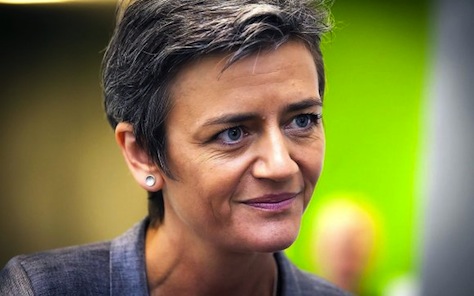She’s not running for anything in Denmark’s parliamentary elections on Thursday, but even from Brussels, Margrethe Vestager, the country’s European commissioner for the high-profile competition portfolio, looms larger than just about anyone on the Danish political scene — included prime minister Helle Thorning-Schmidt and her main challenger for the premiership.![]()
![]()
Less than a year into her tenure as the EU’s top cop on competition law, Vestager has moved forward with narrow charges (in the Commission’s parlance, a ‘Statement of Objections’) against Google for allegedly prioritizing search results from its own Google Shopping program over other results. Hardly a week later, she filed charges against the Russian state energy company, Gazprom, for anti-competitive behavior that the Commission argues resulted in higher prices in the Baltics, Poland and Bulgaria. In recent weeks, Vestager also open an investigation into whether Amazon was abusing its dominant market position to restrict innovation and competition in the e-book industry.
That’s made her, increasingly, a bête noire in the powerful Silicon Valley. Mike Honda, a Democratic member of the US House of Representatives for a California district representing Silicon Valley, denounced the charges in April, arguing that Google was instead one of the most ‘innovative and life-changing technologies in human history.’
It’s not just American and Russian companies — Vestager is also looking into allegations that Luxembourg’s aggressive tax deals with companies violated European Union state aid rules, even though most of the tax decisions came during the administration of Luxembourg’s prime minister Jean-Claude Juncker, now the president of the European Commission and who nominated Vestager for the role last autumn. She’s also investigating several European governments for providing assistance to their respective utilities industries.
* * * * *
RELATED: How Helle got her groove back in Denmark’s snap election
* * * * *
Not since Mario Monti took on General Electric’s Jack Welch and Microsoft’s Bill Gates has an EU antitrust enforcer taken such an aggressive tone with companies operating in the EU marketplace. It’s certainly a more direct, even transparent way of proceeding that her predecessor, Spanish commissioner Joaquín Almunia, who preferred negotiating closed-door settlements — a tactic that did not work, so far, with Google. In a throwback to the Monti days, Vestager last week threatened to block GE’s bid to acquire the French energy business Alstom without further modifications to the proposed merger — and that’s after the French government last year stepped in to demand a better deal. Continue reading Vestager’s profile hangs over Danish election

